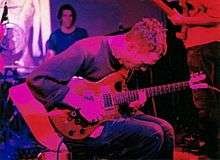David Bryant (musician)
David Bryant is a Canadian musician, recording engineer, and film-maker best known for being a member of Montreal-based bands Godspeed You! Black Emperor, Set Fire to Flames, and Hiss Tracts. In 2015 he co-directed the film Quiet Zone and has written music for other films.
David Bryant | |
|---|---|
 David Bryant in 2015. | |
| Background information | |
| Born | 8 April 1970 Glasgow |
| Genres | Post-rock, drone music, film scores |
| Occupation(s) | Musician, recording engineer, film-maker |
| Instruments | Guitar, tape loops |
| Years active | 1997–present |
| Labels | Constellation, Alien8 Recordings, FatCat Records |
| Associated acts | Godspeed You! Black Emperor Set Fire to Flames Hiss Tracts |

Biography
David Bryant joined Godspeed You! Black Emperor in 1997 as a third guitarist, later also doing recording, mixing, and photography for the band.
In 2001 David Bryant set up the experimental music project Set Fire to Flames combining post-rock with background noise and various other non-musical sound effects, creating a brooding, eerie, and minimalist sound. [1][2]
During the 2003–2010 Godspeed hiatus Bryant met Kevin Doria, of the bands Growing and Total Life, and in 2008 they formed the band Hiss Tracts – named after a Set Fire to Flames song.[1][3] Bryant was also the recording engineer for the three Growing albums released between 2006 and 2008.[1]
In 2015, together with bandmate Karl Lemieux, Bryant directed the experimental documentary short film Quiet Zone. Together with Kevin Doria and Thierry Amar he has also written the score for Lemieux's 2016 feature film Shambles.
In 2017, Bryant collaborated with artist duo Kovács/O’Doherty on their ‘sound and extraterrestrial radio installation’, Signal Tide, which was presented at the Los Angeles County Museum of Art in September 2017.[4] The work combines composed and generative music with the live signal of the LES-1, an abandoned satellite.
Discography
Godspeed You! Black Emperor
- F♯ A♯ ∞ (1997, Constellation)
- aMAZEzine! 7" (1998, aMAZEzine!)
- Slow Riot for New Zero Kanada EP (1999, Constellation)
- Lift Your Skinny Fists Like Antennas to Heaven (2000, Constellation)
- Yanqui U.X.O. (2002, Constellation)
- 'Allelujah! Don't Bend! Ascend! (2012, Constellation)
- Asunder, Sweet and Other Distress (2015, Constellation)
- Luciferian Towers (2017, Constellation)
Set Fire to Flames
- Sings Reign Rebuilder (2001)
- Telegraphs in Negative/Mouths Trapped in Static (2003)
- Floored Memory….Fading Location (2009) includes "Steal Compass/Drive North/Disappear"
- Eleven into Fifteen: a 130701 Compilation (2016) includes "Barn Levitate"
Filmography
As director
- Quiet Zone (2015)
References
- "Review of Hiss Tracts Shortwave Nights". Drowned in Sound, Tristan Bath May 7th, 2014
- "Set Fire to Flames Sings Reign Rebuilder Review". BBC, Dan Hill, 2002.
- Hiss Tracts biography, Allmusic
- "Whispers from Space". LACMA Art + Technology Lab, Joel Ferree, 2017.
- David Bryant Credits AllMusic
- Godspeed You! Black Emperor + Growing = Hiss Tracts. SPIN, March 18, 2014.
- Godspeed You! Black Emperor and Growing Members Team Up as Hiss Tracts for Constellation Debut. Exclaim!, March 18, 2014.